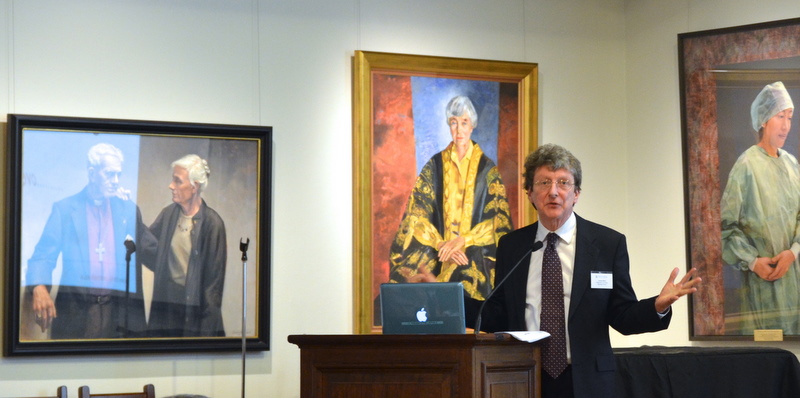
June 3, 2013, by ICCSR
Philanthropy for Business Ethics… down-under
… or ‘up-over’ depending on your perspective…
It is a great honour to have been awarded the position of Gourlay Professor for Ethics in Business 2013, at Trinity College, University of Melbourne.
This fellowship is a result of a very generous philanthropic endowment of John and Louise Gourlay[i] with the express intention of taking thought leaders in the broad area of business ethics to engage with students, academics, practitioners and policy-makers in Australia. The fellowship is designed to enable the Gourlay Professors make two visits during their tenure, amounting to about ten weeks. Trinity College offers a very comfortable and congenial base in which the Professors live and work, and mingle with students, tutors and the College fellows.
I write this as I return to Nottingham from my first stint. So what was it all about?
Well it was a very busy period in which I made various presentations to generate discussion on topics from the general ‘should and can business be socially responsible’ to more specialised topics around ‘CSR and new governance’, ‘the institutionalisation of CSR’, ‘CSR and corruption’, ‘socially responsible investment’, ‘comparative CSR’ and ‘responsibility and irresponsibility in and after the financial crisis’.
In so doing I engaged with a variety of student groups, ranging from executive classes at Melbourne Business School, to undergraduate classes at Monash Business School. I gave public lectures hosted by the University of Melbourne Law School, the Royal Melbourne Institute of Technology, and La Trobe Business School. I met groups of CSR academic researchers. More widely, I gave presentations to consultants, law firms and a church-based group of business people. Finally, I was asked to inaugurate a new development for the Gourlay in the form of an after dinner lecture held at Trinity College to about a hundred invited guests from the worlds of research and practice.
Although I encountered some scepticism about the commitment of business to social responsibility (particularly from academic lawyers and a cleric), there was also plenty of evidence of individuals and organisations being engaged with the topic, and keen to understand its dynamics, scope and possibilities. However, I was puzzled that CSR did not seem to have become as institutionalised in Australia as it had done in Western Europe. After all, my research on CSR in Australia in the 1980s and 1990s had suggested trends that were not so different from contemporaneous UK developments.[ii]
Certainly, some of the big banks and resource companies are well-integrated into international CSR initiatives; the existence of CSR consultancies suggests that Australian businesses are prepared to pay for relevant insights into CSR practices; and there are examples of SMEs committed to responsible business.
However, compared to Western Europe, there was little evidence of:
- governmental initiatives (e.g. around reporting, ethical supply chains)
- CSR business associations
- social responsible investment systems
- fair trade systems.
Arguably it is these sorts of initiatives, and their inter-sections, which have served to institutionalise the CSR which I encounter in Europe.
And no, I don’t have answers, but I invite thoughts on the subject and I look forward to re-visiting this puzzle on my second visit to Melbourne in November.
http://www.trinity.unimelb.edu.au/about/news–media/photo-gallery.html
[i] http://www.trinity.unimelb.edu.au/about/flagship-programs/gourlay-professorship-of-ethics-in-business.html
[ii] J Moon (JM) (2001) ‘Business Social Responsibility as a Source of Social Capital’ Reason and Practice: the journal of philosophy and management 1: 35 – 45
JM and R Sochacki (1998) ‘New Governance in Australian Schools: a place for Business Social Responsibility?’ Australian Journal of Public Administration 55 55-67
JM and R Sochacki (1996) ‘The Social Responsibility of Business in Job and Enterprise Creation: Motives, Means and Implications’ Australian Quarterly 68 21-30
JM (1995) ‘The Firm as Citizen: Corporate Responsibility in Australia’ Australian Journal of Political Science 30 1-17
JM (1991) ‘From Local Economic Initiatives to Marriages a la mode?: Western Australia and Tasmania in Comparative Perspective’ Australian Journal of Political Science 26: 63-78
JM & K Willoughby (1990) ‘Between State and Market in Australia: The case of Local Enterprise Initiatives’ Australian Journal of Public Administration 49: 23-37.
No comments yet, fill out a comment to be the first

Leave a Reply